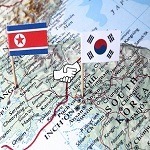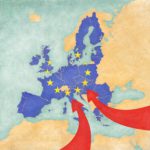The ongoing euro crisis has never been and will never be solved. The native European populations are shrinking and this will have a consequence for the economy, production and public finance. The demographic decline is the single most important economic phenomenon. We do not doubt that the annual visitors to the Global Economic Forum in Davos are fully aware of it: they know that the European and East Asian populations are decreasing and that 18 of the 20 top economies will never experience sustainable growth again. The economic press and mainstream analysts somehow do not get it and still believe that countries that will see their native population shrinking by 30% in the next thirty years can increase their GDP.
Italy is the next epicenter of the demographic crisis. The ongoing euro problems and the orchestrated mass migration into Italy are closely related. Italian population began to dwindle last year, a situation that has never happened in modern history. Without immigration, the Italian working-age population will drop by at least 30% before the middle of the century. If the productivity does not change and even if the Italians are able to balance their budget, the consequences are unsolvable. Continue reading




















